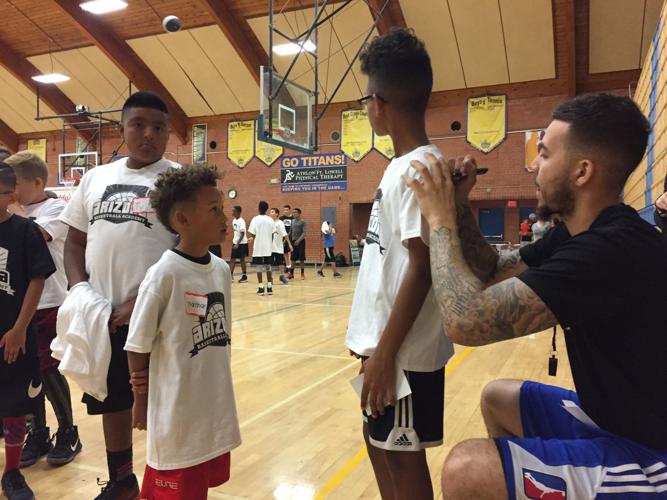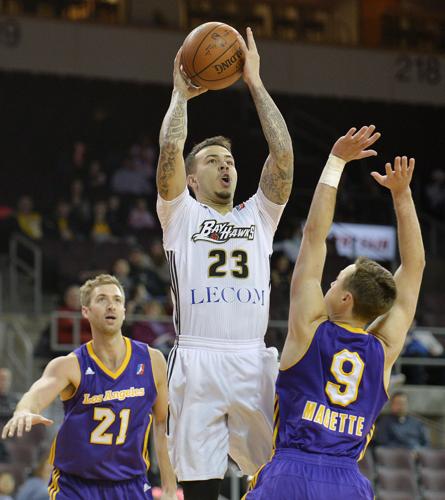In his first game for the Erie BayHawks in November, former Arizona guard Gabe York shot 3 of 12 and missed all five 3-pointers he took.
The next night, he had just five points in 15 minutes.
His worried mother, Deborah, called to offer support.
“I thought he’d be really discouraged,” she said. “He said, ‘I’m just happy to be alive and able to do this. This is so much better.’”
Didn’t matter that it was the D-League, where York was making only about $20,000. Where he shared an apartment some five oft-snowbound miles from Lake Erie. Where he took a bus ride to any game under six hours away and still had to ride two hours to Buffalo before flying anywhere else.
It was basketball in the United States. That would work. For York, it was better than Cremona, the Italian city where he started his professional basketball career last fall.
Not only were there language and culture differences in Italy, and a bunch of big men who clogged lanes and made it tough for York to find the bucket, but York was limited in playing time with the team called Vanoli. He also played for a coach he said had a much different defensive philosophy than UA coach Sean Miller.
“The team was good and the GM was a great guy and still is,” York said during a break from his youth basketball camp last month at Palo Verde High School. “But the head coach and I weren’t right for each other. It was just way different than Arizona. Our coach was like, ‘We have to force them to get to the middle of the lane.’ That’s kind of the worst thing — you let them get to the middle and now they have every option to score or pass, and we were losing by 20 or 30 points.”
York was gone after six games, averaging just 4.3 points and 2.5 rebounds. His coach was fired five games later, with the team at 2-9 — and his successor was fired last month, after Vanoli finished the season at 9-21.
“I’m not here to say, ‘I told you so,’ but it was better that I left,” York said. “I went to Erie and it just skyrocketed. Everything just got better from there.”
By his seventh game in the D-League, York nailed 10 of 13 3-pointers to total 38 points against the Los Angeles D-Fenders. He wound up averaging 15.8 points, 4.2 rebounds and 3.7 assists — while playing point guard on a full-time basis for the first time in his career — then, in May, took part in the league’s Elite Mini Camp in Chicago.
More importantly for York, his phone became busy after the season. Erie, an affiliate of Orlando last season, finished 14-3 last season. But the last time the BayHawks played the Toronto’s D-League affiliate, York said its coach, Jerry Stackhouse, expressed interest.
Before he knew it, York had workouts set up with the Clippers, mini-camp plans with Indiana and Toronto and arrangements to play with Charlotte and the Lakers in NBA summer leagues in July, provided somebody else doesn’t sign him first.
“What’s amazing is that Indiana, Atlanta, Toronto and Orlando have all been able to see my growth since I stepped on the court as a point guard in Erie,” York said. “To see that growth in a short period of time shows I’m coachable, and I can learn to do it, put the work in and it will happen.”
York said he was particularly encouraged that Orlando’s management indicated it came close to calling him up several times in midseason and told him they would love to have him as a two-way player next season if he doesn’t wind up getting a guaranteed deal with another NBA team.
The new two-way contracts are essentially the 16th and 17th spots on each NBA roster, mostly stashing players with D-League affiliates but paying them between $76,000 and $279,000, depending on the number of days they spend in the NBA.
Orlando kept an eye on him last season, and even now that the Magic is no longer affiliated with Erie, York says the team could still be in his future.
“They told me they’re still looking at me as a prospect, that they’ll keep looking at me if paths cross again,” York said. “They said they didn’t have enough space (last season), but I took it as, ‘Thank you so much for being able to tell me that you think I belong.’ It’s been a crazy first year and I had to grow and get stronger from it.
“So hopefully, after a long college career with ups and downs and uncertainty, it’s starting” to get better.
York’s long college career began in 2012 and almost didn’t last in Tucson for long. As a UA freshman, York played in only 15 of 35 games and considered transferring, a longtime speculation that was confirmed when the “At All Costs” documentary released last year showed a disgruntled York talking with his travel-ball coach in a hotel suite during the 2013 Pac-12 Tournament.
“I was only in (the movie) for four minutes, but I think the parts you were able to see showed how I didn’t get to play my freshman year,” York said. “It was kind of messed up, but I don’t have any hard feelings toward coach Miller.”
York said he wasn’t going to return initially as a sophomore, but after he did, his playing time and stats improved every season with the Wildcats. As a senior in 2015-16, he started and played an average of 33.3 minutes, averaging 15.0 points while shooting 42.1 percent from 3-point range.
That kind of exposure and production gave him leverage for guaranteed money from Vanoli, which turned into a buyout when he left the team in November.
Now, still just 23, York has a year of professional experience, some needed point guard credentials to go with his scoring ability, and ... from college and the pros so far, a pretty well-established track record of resiliency.
“That’s the word that every GM and coach has brought up to me,” York said. “There’s always an obstacle in front of me and there’s always some way or somehow that I get over it. It’s awesome to have such a strong, powerful word associated with me.”





